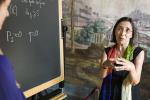
Margarida Mendes Lopes
- Born inPortugal
- Studied inPortugal
- Lives inPortugal
Interview
Photo Copyright: Noel Tovia Matoff, www.matoff.de
This is an EXCERPT of the interview from the catalogue “Women of Mathematics Throughout Europe, a Gallery of Portraits”, published in Verlag am Fluss 2016, [email protected], and featured among thirteen portraits in the corresponding exhibition http://womeninmath.net. See also the EWM newsarticle.
We would like to thank Sylvie Paycha, Sara Azzali, Alexandra Antoniouk, Magdalena Georgescu, and Noel Tovia Matoff for allowing us to use the interview excerpts. Moreover, we acknowledge the work of Veronica Corona and Joana Grah for editing the interview excerpts.
Did you come across obstacles in pursuing your career as a mathematician?
I never really came across obstacles; I feel that Portuguese academics offer equal opportunities to men and women. I chose to have children; had I not had children, I might have started producing research earlier. I am very proud of my children and do not regret my choice. I consider myself very lucky with the career I led. In the 30’s many Portuguese mathematicians were forced to leave the country, which explains in part why in the 60’s the academic environment was rather poor in Portugal. After the end of the dictatorship in 1974 some of them came back and more opportunities to study abroad arose. This and the increasing investment in science in the 80’s created a rich research environment. Portuguese mathematics has since then grown very rapidly.
(…)
In retrospect, are you happy to have chosen mathematics or do you have some regrets? For you, what are the joys of mathematics? What are the hardships?
I have no regrets at all. In mathematics, hardships arise when you spend months looking for a solution which does not work out. But what you have then achieved can turn out to be useful for some purpose. Also, finally finding the solution is a source of pure joy.
I have to admit that I was about to give up doing mathematics when, as a mother of young children, I was trying to finish my thesis, which finally took me 8 years to write up. At that time, I could not dedicate enough time to my work and felt rather isolated in Lisbon before the era of internet and Skype. These are some of the reasons why I started publishing rather late in my career.
What would you recommend to a young woman in your country wanting to start a career in mathematics?
My recommendations would be the same for a woman as for a man. You should make sure that you enjoy mathematics before opting for research in that discipline. I know people who enjoy reading mathematics, but do not aspire at doing research. You should not choose to do mathematics if you want to make money; your salary as a mathematician will never correspond to the amount of time and energy invested in your work. You should be confident, ask questions, try out crazy ideas and follow your instinct. Nowadays, it is not easy to follow an academic career, but you should keep in mind that you can do many different things with mathematics, working at university is not the unique option.
Could you explain your topic of research in a manner understandable to a non-expert?
I study shapes of sets, which you can think of as doughnuts, cones, and so on. In mathematical terms, I work on problems in classification of algebraic complex surfaces. I try to understand what their differences and similarities are and look for ways to distinguish or to identify them. Finding new ways of characterising them by means of new theorems is a very creative process, similar to that of a composer finding a new melody or, for a photographer, finding a new interesting angle and viewpoint on the object to be photographed.
